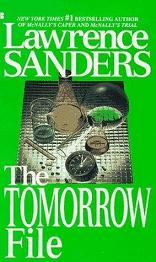
The Tomorrow File
Lawrence Sanders
Berkley, 1975,
551 pages
XII: The Tomorrow File by Lawrence Sanders
Synopsis: The rise and fall of Nicholas Bennington Flair, as detailed in three sections. In the first section, we are introduced to the world of the late 1990s, where the emasculisation of the White House in the late seventies has led to bureaucracies growing ever more powerful and intrusive into people's lives and where the increasing pace of technological advance places greater and greater pressures on people to adapt. Flair and his lover [called "users" in this setting] Paul Bumford are called on by their boss, Angela Berri, to solve the murder of a man named Harris. Although their investigation eventually allows them to arrest the leaders of a terrorist group composed of over-thirty year old [obsos, as they are called, usually lacking the training and mental flexibility to deal with the modern world] and to subvert the terrorist group, Flair and Paul become convinced that Angela herself was the killer and she used them to cover up crimes she has committed. Deeply offended at being used, they plot revenge, while taking advantage of the promotions in the Department of Bliss made possible by Angela's machinations.
In the second section, Flair and Bumford carefully set up a sting operation which results in Angela being arrested, interrogated, tried, found guilty and 'volunteered' for lethal medical experimentation. Flair repeatedly blocks progressive ideas put forward by Bumford. He also tries to deal with the increasing physical deteriorisation of Lewisohn, a genius whose work has been very profitable to the US government.
In the final section, Flair has an affair with the wife of his new boss. He becomes increasingly aware that he is being framed for a terrorist attack using botulism. He solves the problem of Lewisohn, reducing Lewisohn to the status of a very intelligent and immortal head in a jar but fails to deal with the frame effectively. He is arrested, interrogated and comes to the conclusion that his lover Grace Winfield may or may not have betrayed him. He signs the confession given to him and is executed. Paul Bumford continues his rise through the bureaucracies.
I found this a tiring read, for some reason. Possibly trying to get through 500+ pages in a day is a bit much.
It's been about 20 years since I last read this. Sanders' 1998 is wrong, of course, but at least he tried to be wrong in a creative and entertaining way. He completely missed the boat on computers [Moore's Law seems to have stalled around 1980, if that late]. Sanders put a lot of effort into the vocabulary of the late 20th century, trying to give a sense of the values, or lack of values, of the period through their slang. Same with fashions: Sanders spends a lot of time on the clothing and make-up fashionable in '98. There are a lot of full time SF writers who put much less effort into world building than Sanders did.
The two dominating forces in the world of the Tomorrow File are the growth without limit of the power of bureaucracies in the US and the growth without limit of technology, esp in the field of biology. The civil governments, with the exception of one President who forced through various enabling bills, do not have the knowledge to handle the new circumstances and are increasingly out of the loop on important policy decisions.
On the downside, I don't think many of the political measures shown in the TF could happen in such a short time, or perhaps ever: there's a genetic rating system in place and a birth licensing requirement. Parents find their children's gender being assigned for them, for example. Plus, and maybe this is me getting obso, the amazing amounts of sex just slowed the book down.
One amusing note: the United States dropped the 'of America' and is actively recruiting new nations. It's up to almost 100 states and the UK is soon to join, once they decide whether it comes in as one state or three.
On the whole, a bit of a cheesy pot boiler but one with more thought put into it than a lot of books get, especially cheesy pot boilers.